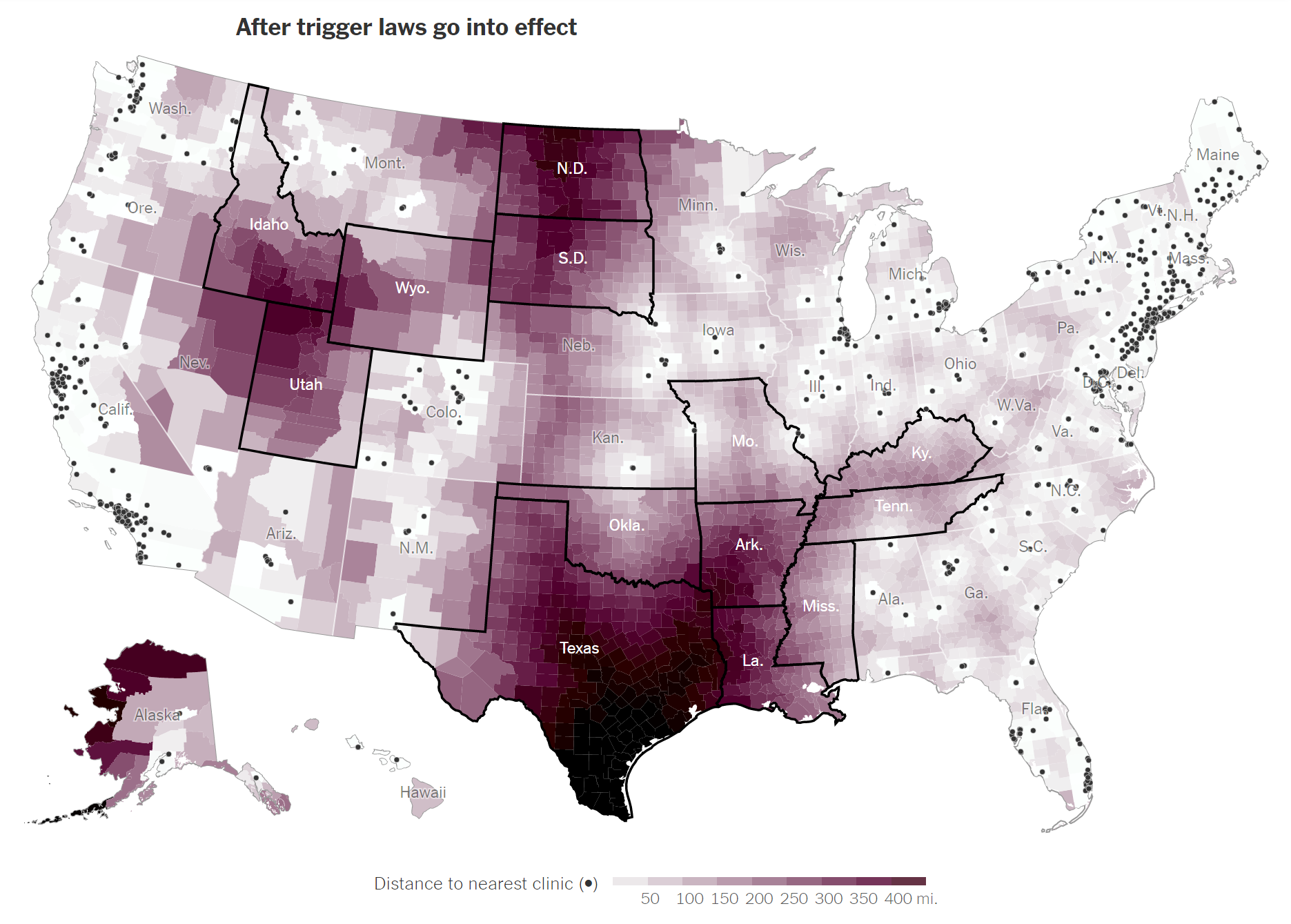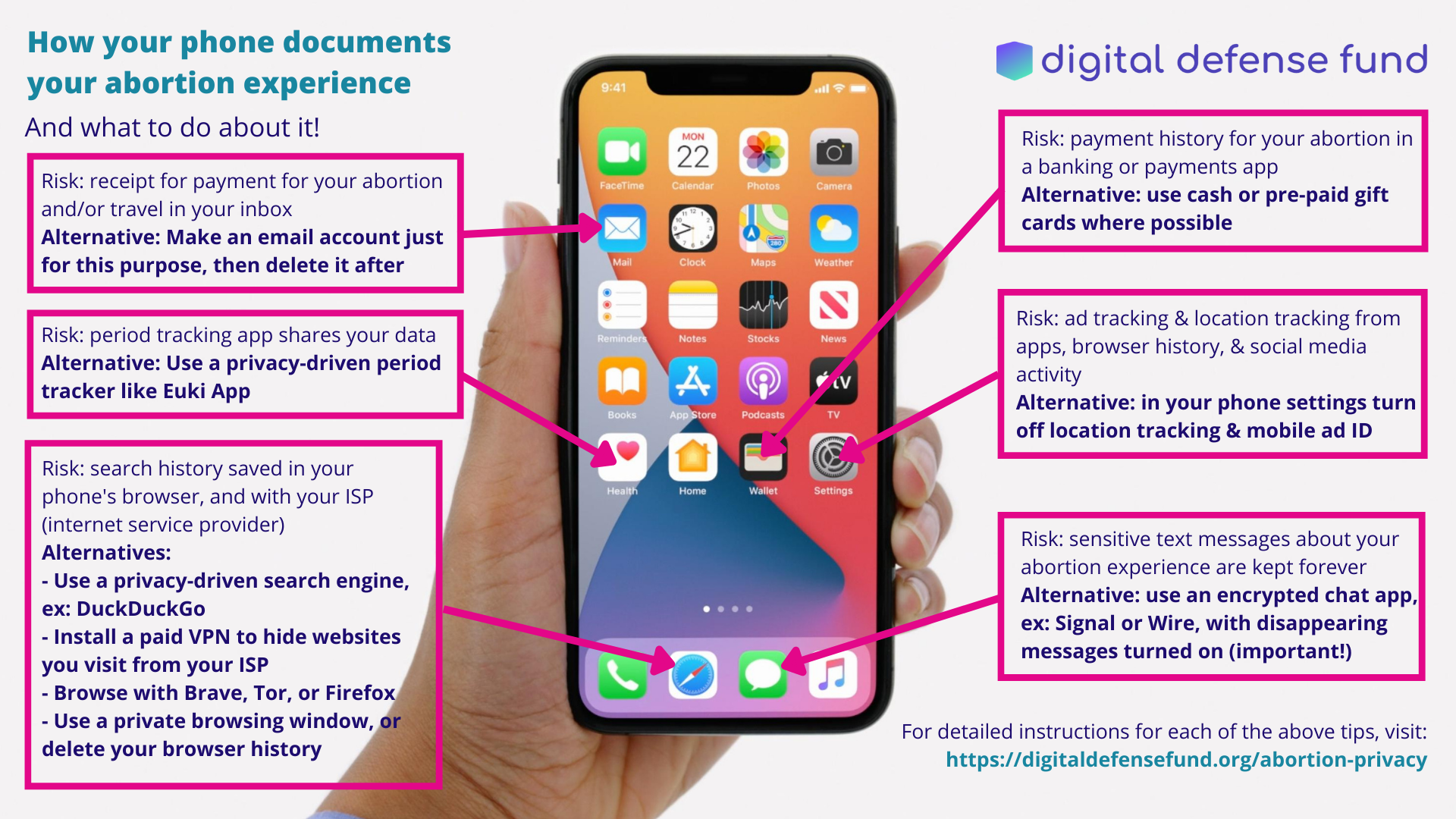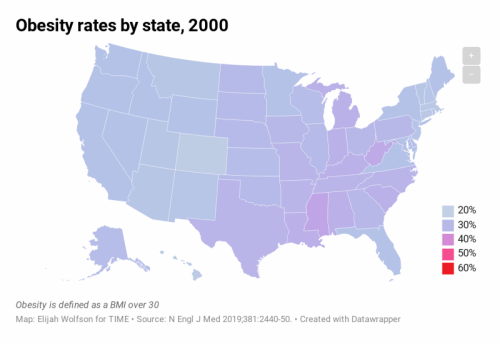Digital surveillance in a nation of criminalized healthcare – Here’s a list of online healthcare resources as access to abortion in U.S. plummets

25 June 2022 (Desdemona Despair) – In the new era of criminalized health care, law enforcement agencies that are investigating abortion-related cases can use an American’s location data, messages, and search histories as evidence against them.
Anybody who comes in contact with a pregnant woman in the U.S. potentially faces prosecution if an abortion-related case is brought by a state where abortions are outlawed, so ensuring your digital privacy is more important than ever.
Let’s say you got your period, stopped your period and then got your period again in a short time. It’s potential evidence of your own criminality, or your doctor’s criminality.
Danielle Citron, law professor at University of Virginia, to CNN in Search histories, location data, text messages: How personal data could be used to enforce anti-abortion laws
CNN reports that “in at least one case, search history data has already been used to prosecute people who seek information about abortion services. In 2018, Latice Fisher was indicted by a Mississippi Grand Jury for second degree murder after an at-home pregnancy loss. While the criminal charges against Fisher were ultimately dropped, law enforcement pointed to alleged internet search results such as ‘buy abortion pills, mifeprisone online, misoprostol online’ to argue their case. (Mifepristone and misoprostol are the two pills frequently taken together by women performing self-managed abortions.)”
For very low fees paid to third-party information brokers, it’s possible to ascertain the movements of Americans who visit Planned Parenthood clinics. “Planned Parenthood” and “Family Planning” are “brands” that can be tracked, and for $160, Vice was able to get a week’s worth of data on where people who visited Planned Parenthood came from, and where they went afterwards.
Before, women had to worry only that Target or Amazon might learn of their pregnancies. Based on what’s already known about privacy incursions by law enforcement against marginalized people, it’s likely that in the post-Roe world women will be more squarely in the crosshairs of digital forensics. For example, law enforcement agencies routinely use forensic tools to search people’s cellphones when investigating a wide range of crimes, sometimes without a search warrant. […] The risk is especially acute in places that foster bounty hunting. In a state like Texas where there is a potential for citizens to have standing to sue people who help others access abortion services, everything you say or do in any context becomes relevant because there’s no probable cause hurdle to accessing your data.
Nora McDonald, Assistant Professor of Information Technology, University of Cincinnati, Online data could be used against people seeking abortions now that Roe v. Wade has been overturned
In his separate opinion on Dobbs v. Jackson Women’s Health Organization, Supreme Court Justice Clarence Thomas called out Griswold v. Connecticut, the 1965 decision that asserted married couples have a right to access contraceptives, so we can assume that the constitutional right to contraception is the one of the next targets. Everything from condoms to birth control pills may be criminalized in some states, so private and secure access for ordering contraceptives is crucial for controlling your reproductive future in hostile states.
In the Law Grad blog, Chamalee Semasinghe observes, “Post-Roe America is no different to living in an autocratic regime. American women who are open to seeking abortions are placed in a similar position as dissidents living under a dictatorship, that they by circumstances are forced to rely on data encryption and privacy tools to keep their most private decisions private and to ward off prosecution for abortion-related offences.”
She recommends taking the following measures to avoid prosecution by women-hostile states:
- Do not use social networks such as FB groups and Telegram Channel with larger public audiences to seek advice on abortion.
- Use VPNs to prevent network providers from tracking your browsing habits.
- Use more privacy-focused internet browsers like Firefox.
- Use auto-deleting function on end-to-end encrypted messaging apps like Signal and WhatsApp.
- Use a search engine that does not track user data such as DuckDuckGo.
- Use a browser extension to block web trackers.
- Shut off GPS location services on your devices to prevent apps from tracking your whereabouts.
- Stop using fertility apps.
Resources for accessing criminalized healthcare securely
Here’s a list of online resources for accessing healthcare in the U.S. and improving digital privacy and security against intrusive laws that deny your bodily autonomy.
Remember that accessing some of these sites may now be used as evidence of criminal intent, so exercise caution!

Digital security and privacy guidelines for abortion access
- Digital Defense Fund: Keep your abortion private and secure.
- Electronic Frontier Foundation: Security and privacy tips for people seeking an abortion.
- Reproaction video: Periods, Pregnancy, Abortion, and Your Digital Security: Keep your internet activity private while you manage your reproductive health online.
Abortion resources
- PLAN C: Learn to access at-home abortion pill options online.
- Hey Jane: Online abortion clinic providing abortion pill delivery.
- AidAccess: Online consultation for abortion pills by mail.
- Abortionprivacy.com: Online pharmacy offering safe and secure pregnancy termination.
- Women on Web: International online abortion service, providing access to safe abortion services.
- Safe2choose: An online counseling and informational platform that supports women who want an abortion with pills or a surgical abortion.
- The Pink Book: A directory of women and LGBTQIA+ safe healthcare practitioners in the U.S.
- Planned Parenthood: Find abortion clinics near you.
- National Abortion Federation Hotline: 1-800-772-9100. The largest national, toll-free, multi-lingual hotline for abortion referrals and financial assistance in the U.S. and Canada.
- Elevated Access: Volunteer pilots who transport passengers to access healthcare at no cost.
- Auntie Network: A place to help anyone who has a uterus.
- Abortion Finder: U.S. abortion clinic locator.
- I need an abortion: Localized search using 3 non-personally-identifiable pieces of information.
- Repro Legal Helpline: Answering questions about self-managed abortion and the law.
Digital privacy and security tools
- DuckDuckGo: Search the web without being tracked.
- Signal: End-to-end encryption that keeps your conversations secure.
- ProtonMail: Secure email that protects your privacy.
- Privacy Badger: Browser add-on that stops advertisers and trackers from secretly tracking you.
- uBlock: Wide-spectrum tracking blocker for browsers.
- New York Times best virtual private networks (VPNs): Mullvad VPN and IVPN.
- TechRadar and PC Magazine: Best free VPNs of 2022.
Activism for reproductive rights
- The Lilith Fund: Helping people pay for an abortion when they can’t afford it.
- Center for Reproductive Rights: Using the power of law to advance reproductive rights as fundamental human rights around the world.
- Planned Parenthood: Delivering vital reproductive health care, sex education, and information to millions of people worldwide.
- Reproaction: Increasing access to abortion and advance reproductive justice.
- American Civil Liberties Union: Project on Speech, Privacy, and Technology
- Electronic Frontier Foundation: The leading nonprofit defending digital privacy and free speech.
Reading
- Consumer Reports: These period tracker apps say they put privacy first. Here’s what we found.
- CNET: With Roe overturned, your abortion searches could become criminal evidence.
- Vox: Police can easily get your data from third parties.
- EFF: SafeGraph’s disingenuous claims about location data mask a dangerous industry.
- The Washington Post: For people seeking abortions, digital privacy is suddenly critical.
- Data Privacy Manager: 8 Best Online Resources to Learn More about Data Privacy and Security.


